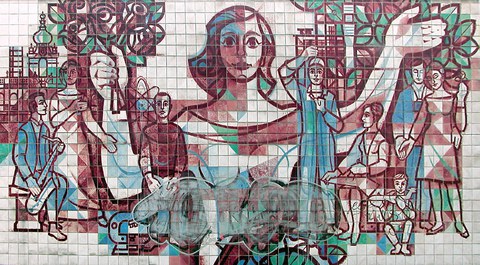Events
Table of contents
- Event series: Transformation East
- Healing after the Holocaust: The Rehabilitation of Jewish Survivors in Postwar Sweden
- “As in the West, so on earth”? University policy knowledge transfer after 1990 as a history of German-German relations
- Refugees in Global Transit: Encounters, Knowledge, and Coping Strategies in a Disrupted World, 1930s-50s
- Lost transformation? Answers from recent history to questions of the present
- From 09.04.2024, 18:30 hrs. Lecture series Art in the GDR TODAY - Researching, teaching, preserving, exhibiting
Event series: Transformation East
The fall of the Berlin Wall and the unification of the old and new federal states are considered to be decisive events for the Federal Republic of Germany and have given rise to a number of areas of tension that are still relevant today. From right-wing extremism to populism, from the liquidation of East German companies to the current development of cutting-edge research, from citizens' experiences of marginalization to their designation as avant-garde - the lecture series illuminates a broad spectrum of narratives that define the specific characteristics of these regions. It becomes clear that even thirty years after the fall of the Berlin Wall, no uniform picture can be drawn. Continuing inequalities in wages and property ownership as well as the low level of representation in politics, the judiciary and academia require further examination and discussion. The lecture series offers a unique insight into the diverse and still current research on this topic. Experts from TU Dresden as well as renowned scientists from various collaborations will present and discuss their findings. We cordially invite you to an exciting exchange about the past, present and future of German unity.
to the series of events in the winter semester 2024/25
to the series of events in the summer semester 2024
Healing after the Holocaust: The Rehabilitation of Jewish Survivors in Postwar Sweden
Panel of the ESSHC organized by PD Dr. habil. Friederike Kind-Kovács, Bengt Sandin and Anders Blomqvist
28.03.2025, 8:30-10:30 am in Herta Mohr 0.26, Witte Singel 27A, 2311, Leiden, The Netherlands
This panel explores the rehabilitation of Jewish Holocaust Survivors in postwar Sweden. Between the spring and summer of 1945 around 12,000 Holocaust survivors were brought to Sweden from German concentration camps and allied DP-camps within the frames of the Swedish Red Cross’ so-called 'White Buses'-operation and an agreement between the Swedish government and the United Nations Relief and Rehabilitation Administration (UNRRA). In Sweden, both the state and various Swedish and international organizations provided the survivors with different forms of aid. Proposing a comparative and transnational approach, with talks on various groups of survivors from different countries in Central and Eastern Europe, the panel tackles the transnational institutional dimension of this endeavor as well as the survivors’ individual experiences in Sweden. Contrasting case studies on Jewish survivors from Romania, Hungary and Poland, the panel seeks to engage with the question of how the survivors’ national background, their distinct experiences in the concentration camps, their age and their gender shaped and affected their reception and stay in Sweden. Through the lens of institutional and administrative sources, letters and life-story interviews, the papers will address the survivors’ physical and psychological rehabilitation, their everyday lives in temporary migration, their search for surviving family members and their preparation for a life after the Holocaust.
Further information can be found here
“As in the West, so on earth”? University policy knowledge transfer after 1990 as a history of German-German relations
Lecture by Aron Schulze as part of the conference “Interactions, Communication, Knowledge in the Transformation Society - From Grand Narratives to Micro Perspectives and Back?”
20.-21.03.2025, Ruhr-Universität Bochum
Further information can be found here
Refugees in Global Transit: Encounters, Knowledge, and Coping Strategies in a Disrupted World, 1930s-50s
International Conference of the German Historical Institute Washington
13.02.-14.02.2025, Mumbai, India
The international conference: "Refugees in Global Transit. Encounters, Knowledge, and Coping Strategies in a Disrupted World, 1930s-50s" will take place on February 13 and 14, 2025 in Mumbai, India. The conference is organized by Simone Lässig (German Historical Institute Washington), Sebastian Schwecke (Max Weber Forum for South Asian Studies, Delhi) and Swen Steinberg (Queen's University, Kingston) in collaboration with Christoph K. Neumann (OI Istanbul), Maria Framke (University of Erfurt) and Jens Hanssen (OI Beirut) and is also part of the Max Weber Foundation's foundation-wide event series "Ends of War - International Perspectives on World War II".
Further information can be found here
Lost transformation? Answers from recent history to questions of the present
Colloquium in the winter semester of the Hannah Arendt Institute
07.11.2024 - 11:10 am until 06.02.2025 and online via Zoom
Description of the event
HAIT colloquium and exercise for students of TU Dresden, organized by Friederike Kind-Kovács and Maren Hachmeister in conjunction with the Dresden-Prague Lectures "Topographies of Transformation", co-organized by Klára Pinerová and the Institute for Contemporary History Research (ÚSD) in Prague.
All events and dates can be found here
From 09.04.2024, 18:30 hrs. Lecture series Art in the GDR TODAY - Researching, teaching, preserving, exhibiting
The lecture series Art in the GDR TODAY brings together experts on East German art to discuss the current state of teaching, research and mediation. Scholars who helped define the field before and after 1990, as well as the next generation of scholars and curators, will present their research perspectives on art in the GDR TODAY on Tuesdays from 6:30 pm starting April 9 in the Görges-Bau. In addition to the university public, the lecture series is aimed at a broad audience from Dresden's urban society and beyond.
To the series of events.

